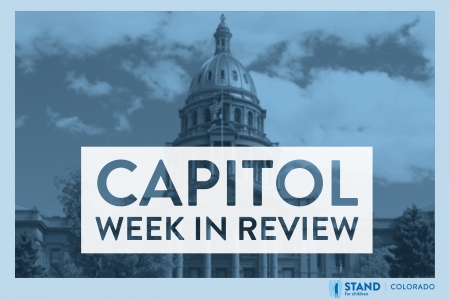Capitol Week in Review brings you news of bills we are tracking around our priorities of advancing educational equity and racial justice in Colorado and making our schools and communities safer and more supportive.
LEGISLATIVE UPDATE
HB23-1001, Expanding Assistance For Educator Programs, which supports student teachers toward the goal of diversifying the teacher workforce, is scheduled to be heard in the Senate Education Committee on March 13.
HB23-1037, Department Of Corrections Earned Time For College Program Completion, which permits an inmate sentenced for a nonviolent felony offense to have earned time deducted from their sentence for each accredited degree or other credential awarded will be heard by the Senate Judiciary Committee March 13.
HB23-1042, Admissibility Standards For Juvenile Statements, which increases funding for interrogation training for law enforcement, as well as improves the general reliability of confessions by requiring all juvenile interrogations to be recorded passed second reading in the House and a final vote is expected soon.
HB23-1064, Interstate Teacher Mobility Compact, which makes it easier for active-duty military spouses to transfer their teaching licenses without further testing, thereby allowing them to teach in Colorado classrooms faster, is headed to the Governor for signature.
HB23-1089, Special Education Services For Students In Foster Care, which designates students in out-of-home placements as residents of the school district of their school of origin to increase stability and learning success, is scheduled to be heard in the House Education Committee on March 16.
HB23-1100, Restrict Government Involvement In Immigration Detention, passed out of the House. For years, Colorado taxpayers have been picking up the bill of the federal government by allowing the state to contract a private company to detain individuals for federal immigration purposes. This bill would prevent any such further contracts and begins a review process of these contracts over the next two years. It passed the House and was introduced in the Senate and assigned to the Judiciary Committee.
HB23-1109, School Policies and Student Conduct, is scheduled to be heard for action only by the House Education Committee March 29. This bill aims to strengthen due process rights for students, particularly as pertains to behavior off school grounds and outside of school hours. It also increases the training for expulsion hearing officers, including training around disabilities and trauma-informed care and interventions.
HB23-1145, Hearing Timelines Juveniles in Adult Facilities, which aligns Colorado law’s hearing timelines for juveniles held in an adult facility while awaiting trial with the timelines in the federal “Juvenile Justice and Delinquency Prevention Act”, passed the Senate on third readings 35-0.
HB23-1198, Teacher Externship Program for Science Technology Engineering and Math Disciplines, which creates a statewide program to provide kindergarten through twelfth grade teachers work-based learning opportunities, passed House Education Committee and was referred to the Finance Committee.
HB23-1207, Stipends For National Board-certified Educators, which allows stipends (up to $3200) for educators serving in low-performing, rural or high-needs school districts, passed the House Education Committee and was referred to the Appropriations Committee.
HB23-1211, Collect Data Language Translation Services Special Education, which requires the Department of Education to track the provision of language translation services related to IEPs and include such data as part of its annual “SMART Act” was postponed indefinitely.
SB23-004, Employment Of School Mental Health Professionals, which authorizes a school district to employ health professions, who are not licensed by the Colorado Department of Education but hold a Colorado license for their profession will be heard by the House Education Committee March 29.
SB23-70, Mandatory School Resource Officer Training, is a bill that would require a law enforcement officer to complete a Safe2Tell training curriculum before working as a school resource officer; it passed the Senate unanimously on third reading.
SB23-181, Concerning Screening of Dyslexia in Public Schools, builds on recommendations for further screening and training on how best to screen for individual literacy deficiencies was introduced in the Senate. The bill also establishes an independent ombudsman to represent parents of students with literacy needs.
Our Take
The House is expected to take a final vote soon on HB 23- 1042, Admissibility Standards For Juvenile Statements.
In Colorado, children of color are one and a half to three times more likely to be arrested and interrogated than their white counterparts (CO Dept. of Public Safety, 2020). As a result, children of color are more often harmed by false confessions, directly contributing to the racial disparity in the criminal justice system.
Currently, law enforcement may use deception during interrogation of youth. As you would imagine, children are more susceptible to manipulation and more likely to provide inaccurate information and false confessions under such pressure. In the last twenty-five years, youth who were exonerated after being convicted of crimes, 38% gave false confessions.
HB 23- 1042, Admissibility Standards For Juvenile Statements will:
- Increase funding for interrogation training for law enforcement, and
- Improve the general reliability of confessions by requiring all juvenile interrogations to be recorded, and
- If law enforcement does use deceptive tactics during custodial, interrogation, the judge may discern whether the resulting confession was voluntary and therefore reliable and admissible in trial.
Read personal testimony in support of this legislation on our blog here, here, here, and here.
Take Action
Last week, members of the House Education Committee heard hours of testimony from students, educators, and legal experts asking them to support HB23-1109, School Policies And Student Conduct. This is legislation that promotes restorative practices, ensures reduced legal system involvement, fosters fairness in a system that otherwise considers students guilty until proven innocent, and creates accountability for unregulated and untrained expulsion hearing officers
Expelling students exposes them to a greater likelihood of delinquency or criminal system involvement and is therefore more expensive and less effective than keeping students in school. Email the House Education Committee and ask them to support HB23-1109.
What We’re Reading
The ‘Science of Reading’ and English-Language Learners: What the Research Says





